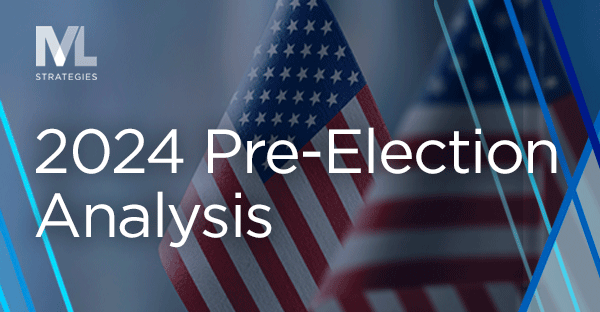2024 Pre-Election Analysis: Consumer Product Safety
In this installment of ML Strategies’ Pre-Election Analysis series, we discuss the potential impact the 119th congress and presidential election on consumer product safety. Like other spheres of federal public policy, consumer product safety laws and regulations could be profoundly impacted by the upcoming November elections. A Congress controlled by one party will likely have a very different legislative agenda than one that is under divided control. Moreover, whoever sits in the White House will likely determine the regulatory and enforcement posture of the US Consumer Product Safety Commission (CPSC or Commission), which is shaped by the political makeup of its five presidentially appointed, Senate-confirmed commissioners, including the chair of the Commission.
The CPSC oversees a wide range of consumer products, including kitchen appliances, children’s toys, and exercise equipment just to name a few. According to the CPSC, incidents related to consumer products result in over $1 trillion in costs annually due to deaths, injuries, and property damage. Established by the Consumer Product Safety Act in 1972, the agency conducts research on potentially hazardous products and informs the public by issuing recalls. These recalls provide consumers with remedies such as repairs, replacement products, and refunds.
CPSC Legislation and Oversight in the 119th Congress
With both the House of Representatives and Senate under razor-thin margins of partisan control, the likelihood of one or both bodies flipping is highly probable in November. If Democrats win control of the House and Republicans take back the Senate, the legislative agendas of each body will likely change, though the ultimate legislative outcome is not likely to differ greatly from the current state of a divided, largely gridlocked Congress. Conversely, if one party controls both the House and the Senate, it’s quite possible that Congress will actively pass laws, conduct oversight in a manner consistent with the ideological proclivities of the party in control, or both. This is true of broader federal public policy in general and product safety policy in particular.
On one side, congressional Democrats often support legislation that provides the CPSC with relatively streamlined rulemaking and enforcement authority to address specific consumer product hazards. That is, such laws usually shortcut rulemaking procedures and criteria by enabling the Commission to promulgate safety standards directly under the Administrative Procedure Act (APA) — the standard rulemaking process for most federal agencies — in lieu of the Commission’s more fulsome and detailed organic rulemaking authority under its authorizing statute, the Consumer Product Safety Act (CPSA). Examples of such laws recently enacted by Congress are Reese’s Law and the Stop Tip-Over of Unstable, Risky Dressers on Youth (STURDY) Act. Notably, these laws were enacted under a Democratically controlled Congress, i.e., control of both the House and Senate.
Note that as an independent agency, CPSC regulations are not subject to many presidential executive orders on regulatory reform or scrutiny by OMB’s Office of Information and Regulatory Administration (OIRA).
On the other side of the aisle, Republican lawmakers are often skeptical of such legislative efforts because, as noted, APA rulemaking procedures skip what they regard as important substantive and procedural steps in the CPSA. For instance, pursuant to Section 9 of the CPSA, the Commission is required to evaluate the adequacy of existing voluntary consensus standards and to further conduct a cost-benefit analysis before promulgating mandatory standards. The APA has no such explicit requirements. While Congress has passed product safety laws attaching additional conditions to statutorily authorized APA rulemakings — e.g., the STURDY Act explicitly directed the Commission to collaborate with stakeholder groups and address furniture hazards based on incident data — the regulatory proceedings are still more streamlined than those established under the CPSA. Furthermore, stakeholders who seek to legally challenge the validity of CPSC rules under APA must clear a higher legal bar relative to a finding that the Commission failed to meet the statutory checklist under CPSA rulemaking procedures. However, it’s worth noting that the Supreme Court’s recent Loper decision overturning longstanding Chevron deference to agency interpretation of statutory ambiguities or vagueness may affect, as a practical matter, the level of judicial scrutiny of administrative action.
Thus, expect a Democratically controlled Congress (or House or Senate) to more readily pass bills addressing specific product hazards, while a Republican controlled Congress would be far less inclined to do likewise.
Furthermore, the party that controls Congress often has different areas of emphasis regarding agency oversight. Democratic lawmakers tend to push the CPSC towards a more aggressive regulatory and enforcement posture to proactively address product safety hazards (both existing and emerging) and to ameliorate perceived deficiencies in consensus voluntary standards and policies. In contrast, Republican lawmakers tend to be more vigilant of regulatory and enforcement overreach, holding the CPSC accountable for actions deemed to be unnecessarily harmful to business interests without the requisite benefits to public safety.
Democratic leadership of the Senate Committee on Commerce, Science and Transportation, which has jurisdiction over the CPSC, will remain the same under Senator Maria Cantwell (D-WA), while the Subcommittee on Consumer Protection, Product Safety, and Data Security will likely continue to see Sen. Amy Klobuchar (D-MN) leading Democrats. Key consumer product safety areas of focus for Senator Cantwell have been residential elevator safety, toy recall systems, cribs, strollers, and space heaters. Senator Klobuchar was one of the sponsors of the STURDY Act (discussed above) and has said that “as global commerce has increased, public concern has grown over the safety of many products imported from abroad, whether they are toys or charm bracelets, seafood or pet food, or tires or toothpaste. We need to ensure that the agencies responsible for protecting consumers . . . have the necessary authority and resources to perform their important duties.”
Republicans on the Commerce Committee are led by Senator Ted Cruz (R-TX), who will presumably continue in his leadership role should he win reelection in November. The Senator has been particularly vocal about the prospects of the Biden-Harris administration banning or restricting the use of gas stoves, saying the “‘CPSC’s blind reliance on Consumer Reports’ gas stove pieces to support potential rulemaking is troubling.” (President Biden and the CPSC have said no such ban is planned.) Senator Marsha Blackburn (R-TN) is the top Republican on the Subcommittee on Consumer Protection, Product Safety, and Data Security and will also presumably continue in that role if she wins reelection. Senator Blackburn was a sponsor of Reese’s Law, bipartisan legislation to strengthen safety standards for products with button batteries frequently found in everyday items.
Republican leadership of the House Energy & Commerce Committee will change in the 119th Congress with current Chair Rep. Cathy McMorris Rodgers (R-WA) not seeking reelection. Aiming to replace her is Rep. Brett Guthrie (R-KY), who introduced the Consumer Safety Technology Act last year, a bipartisan bill that would require the Department of Commerce and other agencies to study the use of blockchain technology for consumer products and safety. Republicans on the Subcommittee on Innovation, Data, and Commerce will likely continue to be led by Rep. Gus Bilirakis (R-FL), who is seeking reelection and won with more than 70% of the vote in 2022. Ahead of a recent hearing on the CPSC budget for Fiscal Year 2025, Rep. Bilirakis stated, “[t]he CPSC has a long history of important, bipartisan work that has helped raise the standard of safety for the goods that people utilize every single day from infant sleeping products to home improvement supplies. More recently, however, the Biden administration has been pushing the CPSC away from its core safety mission towards a radical rush to green agenda, prioritizing actions like banning gas-powered appliances.”
Should he win reelection as expected, House Energy and Commerce Committee Democrats will continue to be led by Rep. Frank Pallone (D-NJ), who is currently the Ranking Member and has stated, “[e]very American benefits from a strong, active, and well-funded CPSC. Unfortunately, their current budget is woefully inadequate and has forced it to reduce staff responsible for safety research, enforcement, and surveillance of thousands of consumer products.” Rep. Jan Schakowsky (D-IL), currently Ranking Member of the Subcommittee on Innovation, Data, and Commerce, is on the ballot in November and will continue in subcommittee leadership if reelected. Earlier this year, the congresswoman introduced the Consumer Advocacy and Protection (CAP) Act, legislation aimed at enhancing consumer protection and ensuring the CPSC can hold companies accountable for consumer safety violations. The CAP Actaims to deter companies from committing safety violations by increasing CPSC’s penalty authority.
The CPSC and Enforcement/Compliance Actions in a Harris or Trump Administration
As noted earlier, the CPSC is an independent agency created and authorized by Congress. Under the CPSA, the five commissioners are all presidentially appointed and Senate-confirmed; by law, no more than three commissioners can be affiliated with one political party. Because the commissioners’ seven-year terms are staggered, the party in control of the White House strives to (eventually) control the CPSC by a 3-2 margin through presidential appointments, subject to the Senate’s confirmation process, which has become increasingly partisan and contentious over the years.
The current Commission is comprised of three Democratic commissioners, all of whom were appointed by President Biden, including the chair, and two Republican commissioners, one of whom was also appointed by President Biden. The terms of all four commissioners, except the chair (although he can be replaced as chair), are set to expire before or during the next administration, giving the next president a significant hand in shaping policy at the CPSC through newly appointed, re-appointed, or elevated (to the chair) commissioners.
Notably, every commissioner is a lawyer and former Hill staffer, which some critics assert belies the Progressive Era doctrine that such agencies would be made up of diverse technical experts.
Like most independent agencies governed by commissioners, the CPSC is prone to partisan disagreements on agency policy. Under Democratic control, the CPSC tends to be more aggressive with enforcement actions and rulemakings that establish mandatory product safety standards. Republican-led Commissions tend to be more restrained in the exercise of this authority, preferring the efficacy of industry initiative and voluntary standards.
Some observers contend that this Commission’s majority and its senior staff have pushed the limits of the law — and perhaps beyond — in announcing a record number of recalls. For example, the Commission has issued so-called “unilateral press releases” that warn consumers about the use of a company’s products. The Commission has used the prospect of such press releases to induce firms to agree to recalls. The Commission has justified the use of this novel approach to overcome public disclosure restrictions codified in CPSA and a company’s unwillingness to conduct a voluntary recall. Industry stakeholders contend that the perceived de facto lowering of thresholds for reporting potentially defective products and requiring recalls often leaves the regulated community in a quandary about the application of the law.
Should Vice President Harris win the election in November, the current Democratic majority of the Commission will likely remain unchanged, as would its regulatory posture. Under a Democratic majority, the Commission in 2023 initiated 14 new rulemakings on mandatory product standards and imposed $52 million in civil penalties. The CPSC is currently engaged in several agency policy initiatives, such as increased agency outreach to underserved communities and a focus on e-commerce retail platforms. Should former President Trump return to the White House, it is probable that a newly constituted CPSC with Republican-appointed commissioners will take a more tempered approach with a heavier reliance on private sector initiative and free market competition.
Critically, a few areas of focus may not change, no matter who controls the White House and CPSC. The desire to make e-commerce platforms more accountable, like brick-and-mortar retailers, is powerful and will not change. The status of such businesses and the use of the “de minimis” exception to tariff and customs inspection, often allowing counterfeit and dangerous products to enter the US uninspected, is subject to litigation, legislation, and even Biden administration rulemaking.
Further and relatedly, a skepticism — some would say even bias — against Chinese made goods and companies is prevalent at the Commission on a bipartisan basis and will continue to motivate various actions.
Closing Thoughts
As the 2024 general election approaches, the potential implications for the US Consumer Product Safety Commission are significant. The outcome could shape the future of consumer protection policies, funding levels, and the prioritization of safety regulations. Industry stakeholders play a crucial role in this landscape, as their commitment to safety standards and collaboration with the CPSC can enhance consumer protection efforts. As we head into this pivotal moment, it’s essential for stakeholders to stay informed and advocate for their policy priorities.
ML Strategies is well-equipped to assist stakeholders in the consumer products sector in achieving their policy objectives and welcomes the opportunity to initiate a dialogue about how we can support your efforts.
More Viewpoints

2024 Election Analysis
August 27, 2024|Blog




